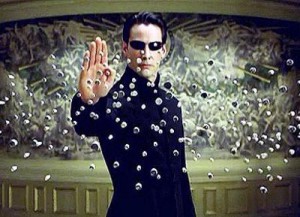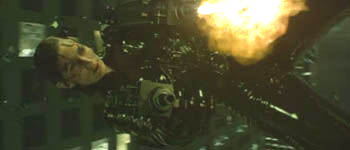|
After the first Matrix managed, somehow, to become a cultural icon with its mix of cyberpunk, fictional science and nihilistic violence, it seemed as if a sequel was inevitable. Filmmaking siblings the Wachowski brothers claimed they'd always intended a trilogy. Perhaps they had. Perhaps they should have, in fact, as the first film, despite its name, managed to never explain why the virtual world known as the Matrix even needed to exist in the first place. This one doesn't either, which is where the benefits sort of fall apart. It also has a giant rave scene, wherein people celebrate their freedom from a machine culture by writhing around to the most soulless, computer-generated music in history, in a grand example of utterly missing the point.  I'm going to buck popular opinion with the suggestion that The Matrix Reloaded is an improvement on its predecessor. It doesn't have that awful stalling feeling in the middle, and as it contains no discussion of science, I'm spared from hearing them explain it poorly. I still have to hear them explain philosophy poorly, however, which is easily just as annoying. As things begin, an indefinite period of time has passed since the end of the first film, and our hero, still played by Keanu Reeves for reasons which continue to confound me, is plagued by nightmares of the death of girlfriend Trinity. The rest of the human populace, driven underground by the machine civilization, harbors fears of their own impending doom, as the machines prepare for the greatest attack ever on the last bastion of free people. Captain Morpheus believes his ship, or at least a ship, should hang back and await possible contact from the Oracle concerning Neo and his so-called "destiny;" his superior officer, Commander Lock (Harry Lennix), thinks all ships need to prep for the coming battle. Listening to the scene, both in terms of what's said and in terms of acting style, one has an overwhelming sympathy for Lock's position. Lennix is acting like a human being; Lawrence Fishburne is acting like a precocious drama student playing a human being, and spouts a lot of delusional-sounding hokum about prophecies that would probably get a real military officer removed from command. Pickings must be short amongst the free populace where leaders are concerned. Naturally, the Oracle does make contact, leading to another of those rather pointless scenes that are supposed to be about contemplation but are just about showing how much the writers didn't bother to think anything through. The rather irritating "folksy-yet-condescending-grandma" portrayal aside, the Oracle never says anything of value. Neo asks her, in response to her offer of candy, how he can actually make a choice if she already knows what he'll decide. It's a valid point; whether one accepts free will or not, it remains irreconcilable with precognition. Her answer infuriatingly dodges the issue by making shit up: "You already decided before you came here." No, he didn't. An altogether separate decision brought him to that point. If I was Neo, I'd have offered the contrary possibility, "Or perhaps you can't actually predict the future, since you have in fact demonstrated no ability of the sort whatsoever," which would also solve the conundrum. Saying "I knew you would do that" after everything a person does is the sort of power anyone with a mouth can achieve. Fortunately, the far more interesting character of Agent Smith shows up again, having broken free of the Matrix since the end of part one, and now existing as a sort of virus, replicating himself endlessly by copying over other humans or even agents, and, in one sure-to-be-important scene, downloading himself into a human in place of the man's original mind. 
Visually, the film is more adventurous than the first, albeit in the same style, just writ larger. The possibilities (if still not the purpose) of the Matrix are expanded as well, depicting sentient programs interecting undetected with the human populace, some indistinguishable, others abberations. (It brings up an interesting point, at least in the film world: did werewolf and ghost legends exist in the pre-Matrix world, when they would have had no physical equivalents?) The story is also more focused and streamlined than the first: Neo must confront the source of the Matrix, which will allegedly bring about its downfall, and this time, with the fate of the human escapees hanging in the balance, there seems to be an actual moral imperative to the struggle, beyond the mind-numbingly simplistic "The Matrix isn't real" excuse given in film one. Often, though, the film overplays its hand with action scenes that, while technically accomplished, are too sterile and go on for far too long. Reeves' kung-fu might be impressive for a novice with no prior training, but it's intensely mechnical and by-the-numbers compared to, say, any movie made in China, ever. The confrontation with the Matrix's Architect (i.e the "man meets his maker" scene) is one of the few actually interesting ideas presented thus far, as the notion of free will is decried as illusory and the truth behind the prophecy of "the One" is revealed; it's the one scene in either film that gave me the impression of any actual clever thought at work behind the curtain. It can't last, however; films aimed at the general public only ever offer one answer to the debate between reason and faith, even though reason has given us hospitals and faith has given us, well, faith healers. Consider one early scene wherein a councilman compares the purpose of a water recycling machine to Neo's abilities, speculating on the respective reasons for each. By choice or ignorance, the argument equates "cause of" with "purpose for" in its definition of "reason." Purpose is not function is not existence; intent is not identity. Whether the character erred, or the writers did, is debatable. However, it can scarcely be debated that making a truly thought-provoking piece of art requires more than just reaffirming what people already think. -review by Matt Murray
|
|
||||||||